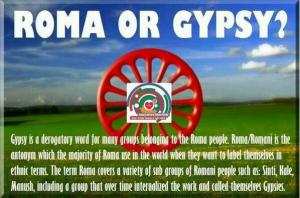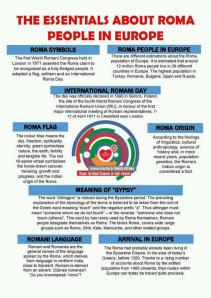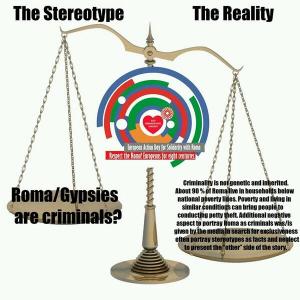Today we celebrate the Roma. We celebrate the plates of food we leave for our ancestors to keep them loved and fed even in death. We cover mirrors, TV and computer screens, and bowls of water after someone dies, just long enough so that they are not trapped by their own reflection as they pass through the veils. We keep our homes and our bodies meticulously clean because the world is split into that which is pure and impure. The spirit is pure; that’s what we want to be. We believe in kintala, or karma, because what we do matters and we mean to do good. We love The Goddess of Fate and her many names and forms, Sati-Sara, Sara Kali, St. Sarah, The Black Madonna; and we believe in free will.
We remind you that “Roma” is our preferred term, not “Gypsy,” a name that has been turned against us, warped into “gypped,” gyppo,” and the lowercase “gypsy,” the one that doesn’t recognize us as a proper noun, never mind a proper ethnic group. We celebrate that some of us chose to reclaim the word as we wish. We remind you that we, as a culture, are fractured by distance, persecution, and illegal deportation, and we are working to unify, to overcome discord and fight for our basic human rights. We celebrate that we are not homogenous and yet, we are united by our origin. We came from India, migrated in the 11th century, and the Rromanes (Romani language) root is Sanskrit. We are different clans—Kale, Kalderash, Lovara, Sinti, Manouche, Vlach, and many more, all with unique customs, dialects, and worldviews. We are individuals: rich, poor, artists, lawyers, blacksmiths, fortune tellers, musicians, doctors, dancers, mechanics, horse dealers, car dealers, janitors, politicians, activists, writers, professors, actors, executives, beggars, volunteers, producers, landlords, and linguists. Opre Roma: we rise up. We are loving friends, partners, parents, brothers, sisters, sons, and daughters. To say “I love you” we say, “I eat your heart” or “I eat your belly” because love is voracious and can never be close enough.
My grandmother survived WWII Germany as a Romani woman. Now she likes to say, “I am a weed. No one wanted me, they tried to destroy me, but I grew. I am a weed and I’m proud. And I’ve always liked weeds best, anyway. Wild, strong, and very pretty.”
Today we raise awareness that half of Europe’s Romani population died in the Holocaust, what we call O Porrajmos (The Great Devouring), and 2 million Romani lives lost is a modest estimation. We are rarely invited to or acknowledged in Holocaust remembrances or memorials. Sometimes we are not even allowed in the gates. We remind you that Roma were slaves alongside African Americans in the United States, and in the Balkans for four centuries. We are forcibly sterilized in Europe and the U.S., alongside Native Americans and African-Americans. We remind you that the government takes Romani children in the United States and Europe from their families because it is assumed that Roma cannot be decent, loving parents. We remind you that America has “Gypsy Crime” task forces that decide Romani fortune tellers are scammers and white fortune tellers are not. America, the country that swears to the flag not to indulge in racial profiling, blatantly profiles its Roma, just like Europe. We remind you that skinheads set Romani encampments on fire across Europe with Molotov cocktails, burning men, women, and children in their beds. We remind you of the Jobbik Party. Roma are forced into camps with no running water, waste management, electricity, or shelter. Roma are denied a right to education, or forced into special education classes because it is assumed we are mentally deficient. Amnesty calls the Romani human rights crisis “Europe’s shame,” and Roma endure hate crimes, are not allowed in shops, and are kicked out of countries because the politicians believe we cannot assimilate, that we are vermin, that Hitler didn’t kill enough of us. We remind you that Roma say, “Fuck you, Fascists. We rise up.” You learned none of this in school.
You see why I cannot be quiet when we are misrepresented and mistreated. She is my community and I am hers, and I am ill-equipped. So I write about fashion, take pictures, and tell stories I cannot show her because they make her too sad. I talk with my friends. I teach a class. I get angry on social media. I worry that none of it means anything but I keep talking, keep writing.
Today we celebrate Romani writers, activists, artists, and professionals who show the world who the Real Gypsy Warriors are: Dr. Ian Hancock, Oksana Marafioti, Morgan Ahern, Rajko Ðjurić, Ronald Lee, Lita Cabellut, Papusza, Mariella Mehr, Romani Rose… to count them would be reductive. Please, discover. We celebrate the language that’s been beaten out of so many Roma that it threatens to disappear. Please, revive.
We celebrate that we are not slutty Halloween costumes or tambourine vamps. We are not spell casters, scapegoats, child-stealers, criminals, or exotic props for stories. We remind you that you cannot decide to be a Gypsy. It is not a lifestyle choice. It is not whimsy. Nomadism was born from persecution, not some lighthearted folly. We are not a brand like Gypsy Warrior, Junk Gypsy, Band of Gypsies, and Spell and the Gypsy Collective make us out to be. We are not fantasies to be appropriated and exploited—we don’t care that retailers think it’s beautiful to perpetuate harmful stereotypes and diminish the human rights crisis. We don’t care that they didn’t know better. We’d appreciate it if you remind them of that via letters, email, Twitter, and Facebook . Respond to articles and writers who slander us. Be a voice of reason and education. The silence of the privileged is a choice whereas the silence of the oppressed is a shackle. We appreciate our allies—they speak from a place that we cannot, just as we speak from a place that they cannot. We need both parts.
To be a Gypsy is blood, cultural and traumatic inheritance, and the gorgeous ache you cannot forget. It is Esma Redzepova singing the Romani anthem, “Dzelem, Dzelem” and the fiddle that bows up your bones. It is grilled lamb feast 40 days after the spring equinox for “Ederlezi” and throwing flowers in the river. It is your patient struggle to teach yourself Rromanes by learning that folksong after work, the pleasure of your voice finding words for mommy, daddy, and sacrifice. It is the paprika soup that warms the winter. It’s the fear of others’ reactions. It’s despair when Lady Gaga, Halle Berry, Miley Cyrus, Shakira, and people of influence use the slur “Gypsy.” Even if they don’t realize what they’re saying, it degrades and diminishes, and you can bet that they don’t use the opportunity to discuss Romani oppression. That’s not sexy. You’re angry that you care that much about Miley Cyrus. But really you’re angry because she reminds you how much work there is to be done, that antigypsyism has become idiomatic, and so many gadjé still think cultural appropriation is their right, and the more they do it, the worse it gets.
We remind you that we are people with dignity still fighting for our rights and it shouldn’t be taking this long. We invite you to join us. Celebrate: drink in today like “the water that wanders.”
International Roma Day hashtag activism: #nohatespeech #romarights #RealGypsyWarrior #RomaDay
Suggested Resources for Romani culture and rights:
We are the Romani people by Ian Hancock
The Pariah Syndrome: an account of Gypsy Slavery and Persecution by Ian Hancock
Roads of the Roma: a PEN anthology of Gypsy Writers (Threatened Literature Series) Edited by Ian Hancock, Siobhan Dowd, and Rajko Ðjurić







